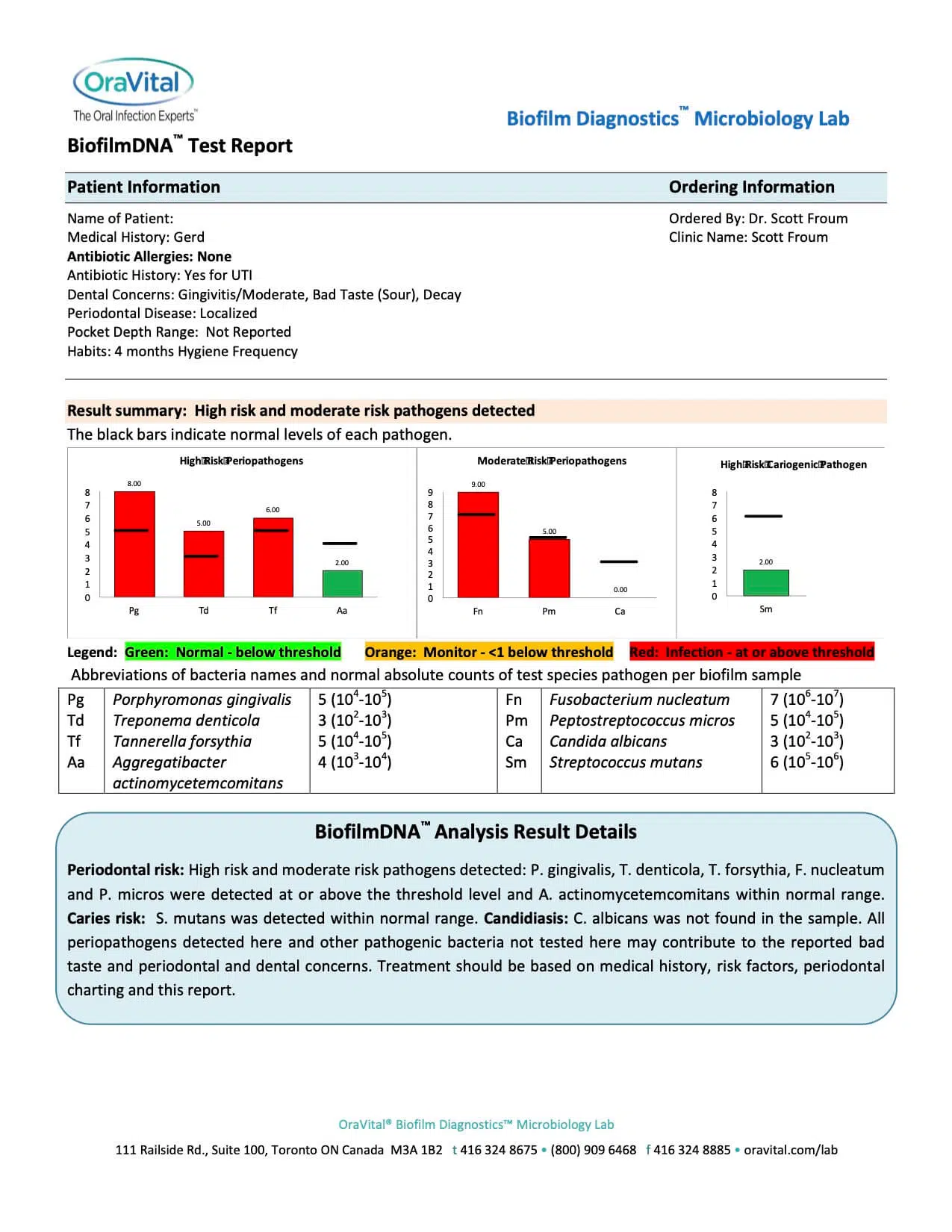Dr. Scott Froum provides bad breath treatment to patients in Midtown NYC. Contact us at 212-751-8530 to learn more or schedule an appointment.
What Causes Bad Breath
Bad breath can be caused by problems in the mouth, digestive system, sinus cavity, nasal cavity, and respiratory system. Oral microflora, made from hundreds of types of bacteria that are naturally found in your mouth, digest the same foods that you eat when they are left on your teeth. The waste these bacteria create, called volatile sulfur compounds, lead to bad breath. In addition, these volatile sulfur compounds can cause inflammation and damage to the gum tissues that support your teeth. This can have a cyclic effect because the “pockets” that develop from gum disease can trap bacteria and lead to waste products that affect breath.
In addition, smoking, aging, and medications that dry out the mouth, can lead to an increase in these compounds. Devices such as removable dentures, spaces between teeth, cavities, broken down teeth, crooked teeth, poorly fitting crowns, and braces can also trap food, leading to bad breath.
Things outside of the mouth such as digestive problems, gastric reflux disease, sinus infections, and some genetic disorders can also cause bad breath problems. For example, bacterial by-products from the lungs and sinus cavity are directly linked to the mouth and can result in bad breath. Inflammatory bowel disorders such as colitis & Chron’s disease and other diseases that cause inflammation of the digestive system have been known to have a negative effect on breath.
Bad Breath Diagnosis
There are multiple methods to diagnose bad breath. Subjective tests that are not tremendously reliable include exhaling and smelling your breath, smelling the floss or interproximal devices after use, licking your wrist and smelling it, and asking your friends and family if they detect a bad odor. Other more objective tests include Gas Chromatography which uses a machine to detect volatile sulfur compounds in your breath even at low concentrations and DNA PCR tests which are able to detect the specific oral bacteria in your mouth known to cause bad breath. Proper diagnosis is key to finding successful treatments.
Bad Breath Solutions
There are multiple methods to diagnose bad breath. Subjective tests that are not tremendously reliable include exhaling and smelling your breath, smelling the floss or interproximal devices after use, licking your wrist and smelling it, and asking your friends and family if they detect a bad odor. Other more objective tests include Gas Chromatography which uses a machine to detect volatile sulfur compounds in your breath even at low concentrations and DNA PCR tests which are able to detect the specific oral bacteria in your mouth known to cause bad breath. Proper diagnosis is key to finding successful treatments.

Frequently Asked Questions
What can I do to prevent bad breath?
- Get regular check ups with your dentist to look for cavities and gum disease
- Eat a healthy diet, drink plenty of water, and avoid tobacco and alcohol.
- Make sure your gut health and sinus problems are under control
- Check with your doctor regarding food sensitivities that may cause bad breath
Do certain foods cause bad breath?
Certain foods can cause bad breath for that specific person. Typical foods that are known to have odors can include garlic, onions, and curry but that is culturally determined. Foods that don’t agree with you and cause gut sensitivity are more likely to be the candidates to cause problems. For example if a person is lactose intolerant and they have dairy, they will not only develop intestinal issues but can also develop bad breath
Do dental problems cause bad breath?
Yes, dental issues that can cause bad breath include:
- Cavities, gum disease, thrush (yeast infections), dental abscesses, food being caught between the teeth, tonsil stones
- Poorly fitting crowns or veneers
- Dentures that are not cleaned well
- Braces & clear aligners that are not cleaned well
- Orthodontic appliances
Can health issues contribute to bad breath?
About 20% of bad breath is caused by medical issues or a person’s medications:
Stomach: Leaky gut, inflammation of the gut, poor digestion, acid reflux, and irritable bowel diseases can all lead to bacteria in the stomach causing odors in the mouth
Sinus: Sinus infections, post nasal drip, sinus congestion, chronic sinusitis and other problems with the sinus draining can lead to an excess of bacteria that cause odors and it then can cause the mouth to have bad breath
Dry mouth syndrome (xerostomia). Dry mouth syndrome occurs when there isn’t enough saliva present in your mouth to protect your oral tissues from accumulating bacteria that can cause odor. Saliva also protects your teeth and gums by being antibacterial
Other underlying medical problems that can contribute to bad breath include:
- Many medications including ant-anxiety, anti-depression, heart medication, allergy medications, antihistamines, among other medications
- Diabetes
- Sjögren’s syndrome
- Autoimmune diseases
- Certain types of cancer
- Immunocompromised disorders
- Head and neck radiation
How effective is mouthwash against bad breath?
Not tremendously.
Many mouth rinses have alcohol in them so they temporarily mask the bad breath then can make it return to even a higher level because they dry out your mouth.
Compounded mouth rinses that contain antibiotics can kill bad bacteria and then if they are followed by a mouth rinse that is probiotic and promotes healthy bacteria, mouth rinses can be effective.
The best mouth rinses are those that keep the teeth and oral tissue moisturized without drying them out. These types of rinses do not contain alcohol.
To learn more contact us today for an appointment.
Related Topic:
Frequently Asked Questions About Bad Breath Treatment
The Chao Pinhole Surgical Technique is a specialized procedure designed to address gum recession, which is commonly caused by gum disease, orthodontics, genetics, and/or aggressive brushing. By using this technique, we can effectively treat the condition and reduce the occurrence of exposed tooth roots, leading to increased sensitivity and an unsightly smile.
During the Chao Pinhole Surgical Technique, the surrounding gum tissue is carefully loosened and repositioned to address the receding gums. Additionally, small strips of collagen or other biomaterials are strategically placed to provide support and stability to the affected gums. This not only protects the tooth roots but also promotes a more even and healthy gum line.
The surgery allows for improved protection and coverage of the tooth roots, alleviating sensitivity and preventing further recession. Moreover, it results in a more aesthetically pleasing appearance, as the gum line is restored to a healthier state.
Ultimately, the Chao Pinhole Surgical Technique offers an effective solution for treating gum recession and can fix gum disease. Through the repositioning of gum tissue and the application of collagen, a more balanced gum line and increased tooth root protection are achieved, leading to improved oral health and a more confident smile.
Gum disease has different stages, each requiring different treatment options. It is important to understand these stages to effectively prevent and treat gum disease.
The first stage of gum disease is called gingivitis. It is characterized by inflammation and bleeding of the gums. In this stage, non-surgical treatment options are available. Regular dental cleanings and deep cleanings can effectively remove the plaque and tartar buildup that contribute to gingivitis. Additionally, it is essential for the patient to commit to maintaining good daily oral hygiene practices, such as brushing and flossing, to prevent the progression of the disease.
If gingivitis is left untreated, it can progress to a more advanced stage known as periodontitis. In periodontitis, the bacteria buildup continues to affect the gums and can lead to the formation of deep pockets between the teeth and soft tissue. This condition causes the gums to pull away from the tooth roots, resulting in bone loss and possible tooth loss. Treatment for periodontitis may require gum surgery.
Therefore, early detection and immediate intervention are critical in preventing the progression of gum disease. Regular dental visits for professional cleanings, coupled with good oral hygiene habits at home, can significantly reduce the risk of developing gum disease and the need for surgical interventions. It is essential to work closely with your dentist to identify the specific stage of gum disease and determine the most appropriate treatment plan for your individual needs.
Periodontitis, if left untreated, can lead to several consequences that impact both oral and overall health. One major consequence is the potential loss of teeth as the gums recede, which can significantly affect an individual's ability to chew properly and maintain good oral hygiene. Additionally, the loss of the jawbone, which can be triggered by gum disease, can further accelerate tooth loss and alter the facial structure and appearance.
Beyond the oral impacts, periodontitis can have serious implications on overall health as well. Research suggests that individuals with periodontitis have a higher risk of experiencing heart attacks and strokes. The exact reasons for this connection are still being studied, but it is believed that inflammation and the spread of bacteria from infected gums may contribute to the development or exacerbation of cardiovascular problems.
Moreover, managing diabetes and maintaining healthy blood sugar levels can become more challenging for those with periodontal disease. The presence of gum disease can make it harder to control diabetes by affecting insulin resistance and increasing blood sugar levels. This bidirectional relationship between periodontitis and diabetes highlights the importance of addressing gum disease to effectively manage the condition.
In summary, the consequences of periodontitis extend beyond just oral health. Tooth loss and jawbone loss are potential outcomes that impact the appearance and functionality of the mouth. Additionally, the risk of heart attacks, strokes, and difficulties in managing diabetes are heightened in individuals with periodontal disease. Thus, seeking timely treatment and practicing good oral hygiene is crucial to maintain both oral and overall health.
